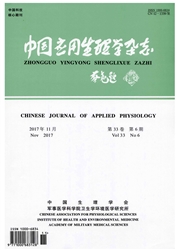

 中文摘要:
中文摘要:
目的:研究长期练习太极拳运动对老年人自主神经系统调节功能的影响。方法:本文以辽宁省老干部大学太极拳练习班的18人为研究对象,将受试者分为两组。长期锻炼组10人,初学者8人。实验采用具有一个重复测量的两因素设计。利用ME6000生理电信号采集器、Pro Comp Infiniti呼吸感应器、水银血压计采集受试者练习太极拳前安静时,练习太极拳运动后30 min、60 min的心电、呼吸以及血压数据。结果:安静状态下,长期锻炼者心率变异性(HRV)的RR间期、正常RR间期的标准差(SDNN)、总功率(TP)、低频功率(LFP)、高频功率(HFP)、标准化高频功率(n HFP)频率显著高于初学者组,而低频/高频功率(LFP/HFP)、收缩压和舒张压、安静心率显著低于初学者。安静状态下,长期锻炼组受试者呼吸频率显著低于初学者。练习太极拳运动后,TP、n HFP、LFP/HFP以及HR和收缩压指标均有显著变化,同时发现长期锻炼组这些指标受太极拳运动影响的效应尺度要大于初学者。结论:长期坚持太极拳运动能够显著提高老年人迷走神经的调节作用同时减弱交感神经的调节作用。
 英文摘要:
英文摘要:
Objective: To examine the effects of long-term Tai Ji Quan( Chinnese Traditional Exercise) on automatic nervous modulation in the elders. Methods: Tile 18 subjects from Tai Ji Quan exercise class in Liaoning University of Retired Veteran Cadres were assigned into long-term Tai Ji Quan exercise group including 10 subjects and novice group including 8 subjects. Electrocardiography, respiratory and blood pressure data were collected on the following time points: at rest before Tai Ji Qhuan exercise and 30 rain or 60 min after Tai Ji Quan exercise. Results: Tile subjects at rest state in the long-term Tai Ji Quan exercise group showed higher titan the subjects in the novice group in resperito- ry rate(RR), standard deviations of normal to normal intervals (SDNN), total power (TP), row frequency power(LFP), high frequency power (HFP), notarized high frequency power (nHFP), but lower in LFP/HFP, systolic and diastolic blood pressure, and heart rate. At rest state the respiratory rate of subjects in long-term Tai Ji Quan exercise group was significantly lower than the novices, After Tai Ji Quan ex- ercise, TP ,nHFP LFP/HFP, heart rate and systolic pressure showed significantly changes, and the change level of Tai Ji Quan on these in- dices was larger in Tai Ji Quan exercise group than that in the novice group. Conclusion: Long-term Tai Ji Quan exercise can improve vagal modulations, and tend to reduce the sympathetic modulations.
 同期刊论文项目
同期刊论文项目
 同项目期刊论文
同项目期刊论文
 期刊信息
期刊信息
